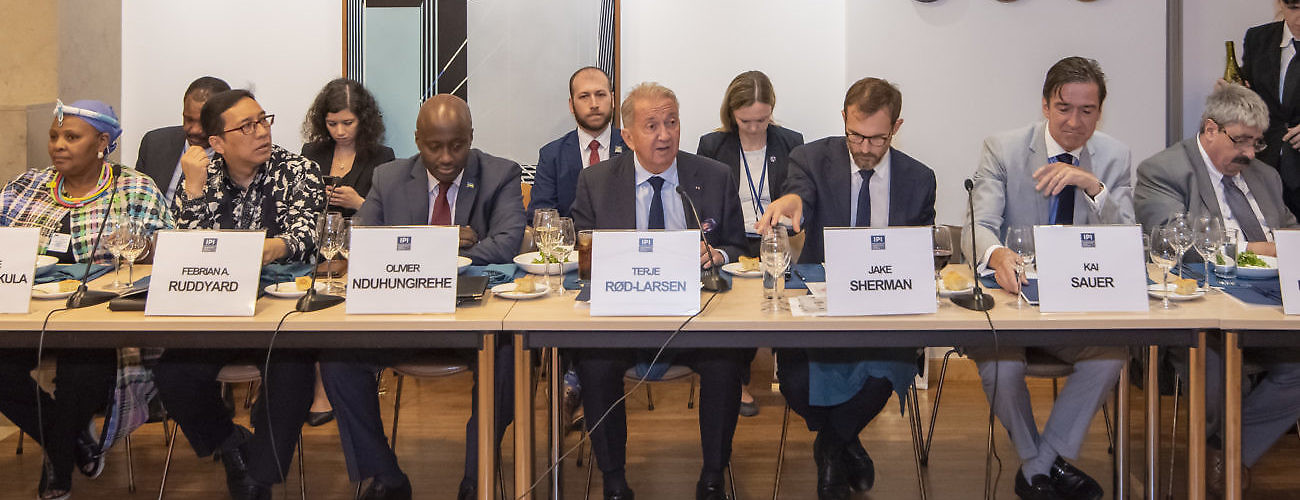On September 25th, 2019, the governments of Finland, Indonesia, Rwanda, and Uruguay, and IPI co-organized the seventh annual ministerial dinner on United Nations peace operations on the sidelines of the 74th annual UN General Assembly debate. The dinner was attended by foreign ministers and high-level delegates from capitals representing member states; the UN Under-Secretary-General for Peacekeeping Operations, the Under-Secretary-General for Operational Support, and the AU Commissioner for Peace and Security were also in attendance.
This year’s high-level dialogue focused on strengthening partnership between the UN, regional organizations, and sub-regional organizations. Partnerships between the UN and regional arrangements, including the African Union, European Union, and regional economic communities, have become an important means of addressing complex peace and security challenges. In the Central African Republic, Mali, Somalia, and elsewhere, responsibility for peacemaking and peacekeeping is shared among multiple entities. Regional and sub-regional organizations often act as first responders in a crisis, drawing on political relationships, contextual understanding, and a willingness to act that complement the role of the UN. At other times, these same strengths present risks to effective engagement. As part of the Secretary-General’s Action for Peacekeeping initiative, member states and multilateral organizations, including the AU and the EU, committed to “enhance collaboration and planning between the UN and relevant international, regional, and sub-regional organizations and arrangements… while recognizing the need for a clear delineation of roles between respective operations.”
Participants examined contemporary dynamics of various partnerships in peace operations, including peacekeeping operations as well as broader conflict management efforts. While the discussions focused on the UN and its partnerships with the AU and the EU, participants noted with encouragement the growing space for other multilateral organizations—such as the League of Arab States (LAS), Organization for Security and Co-operation in Europe (OSCE), Association of Southeast Asian Nations (ASEAN), Organization of American States (OAS), and North Atlantic Treaty Organization (NATO), among others—to strengthen their contributions.
The partnership between the UN and the AU on peace and security received particular attention during the discussion. Participants highlighted the informal division of labor that has emerged between AU-led peace support operations and UN peacekeeping operations: the AU is often better positioned to serve as a first responder and intervene immediately in crisis situations, while the UN can undertake longer-term engagement on stabilization activities (e.g., demobilization, disarmament, and reintegration, electoral support, and rule of law) in environments backed by political processes. Discussions also reflected on the significant growth in the partnership’s political and operational dimensions over recent years. In this light, participants emphasized how more structured policies and more frequent consultations have helped the organizations align their understandings and more quickly work towards collective responses. Participants also recognized the urgency of ensuring predictable and sustainable financing for AU-led peace support operations, and how continued shortfalls in this regard inhibit the effectiveness and capabilities of peace operations that undertake work that the UN is unable to perform.
Participants underscored the centrality of partnerships for the future of peace operations. They universally agreed on the importance of leveraging complementarity in different contexts, and that collective action was essential at a time of broader challenges to multilateralism. While participants acknowledged areas for additional progress at both the political and operational levels, they were nonetheless encouraged by the pace at which partnerships had grown and the significant opportunities to build on this momentum moving forward. As one participant aptly summarized, “Whatever works for peace is good. It doesn’t matter who leads, partnerships are all about flexibility in reaching a collective goal.”








